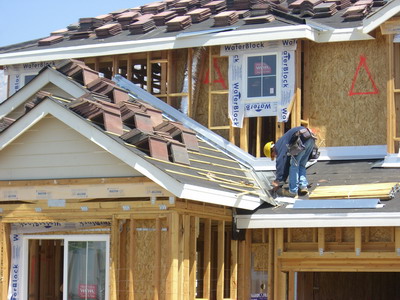
Why Choose Roofing Felt Underlayment?
Roofing underlayment is an extremely important aspect of a roofing system, as it acts to prevent the ingress of moisture into the sheathing and roof structure. Roofing felt, also known as “builder’s felt” or “roofing felt paper”, is the most commonly used form of roofing underlayment. Purchased in roll form, roofing felt is available in a selection of materials, and each one is suited to a specific roofing shape. The advances made in technology and materials have given way to many new features displayed by roofing felt, apart from water proofing and moisture protection. For example, roofing felt can be purchased with a “breathable” feature, which combines the passing of moisture with ventilation in order to minimize condensation levels in roof spaces. Although installation is relatively simple, roofing felt paper should only be installed by professionals, as mistakes can be easily made. Our contractors offer reputable roofing felt installation services, as well as maintenance, repair, and cleaning assistance for all roofing types.
 |  |  |
Roofing Felt Materials and Properties
Roofing felt paper is used as a secondary membrane in residential buildings, and required for roofs sheathed with asphalt shingles. Roofing felt is made of a fiberglass or polyester fleece that is saturated with bituminous impregnating agents, such as asphalt, tar, and bitumen. Sometimes additional minerals such as sand are added to provide protection against atmospheric stipulations. Organic roofing felt (usually asphalt saturated) provides additional protection against heavy rain, and minimize the “picture framing” of shingles. However, roofing felt paper is susceptible to tearing, especially in warm climates, and make applying the roof covering difficult as it is slippery.







 Loading Roof101.com...
Loading Roof101.com...